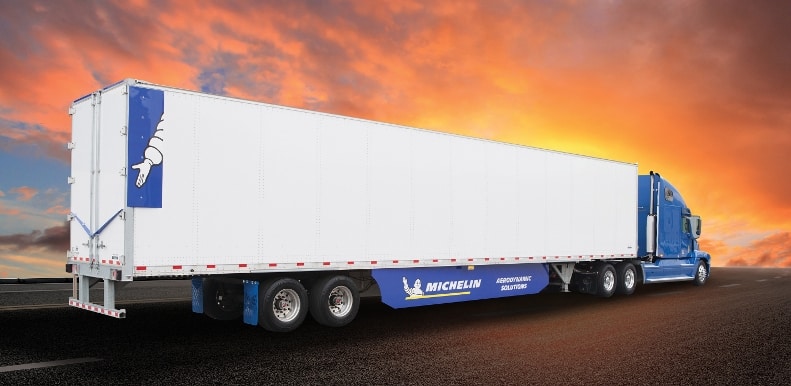
No longer just a tire company, Michelin is quickly becoming a “solutions” company as it looks to position itself as a business its customers can rely on regardless of their needs.
“It’s not enough to be a product, it’s not enough to be a product company anymore,” Ralph Dimenna, senior vice president-Global Services and Solutions for Michelin, told FreightWaves in an interview at this week’s Movin’ On by Michelin Global Summit in Montreal. “You have to be able to provide solutions.”
Movin’ On is the perfect setting to be discussing how Michelin is now positioning itself. The conference is a sustainable mobility event that features all forms of transportation and transportation solutions. The event includes a Startup Village for early-stage companies to show their potential industry solutions.
Michelin has been branching out over the last several years to offer more than just tires to customers. Many are now aware of the company’s roadside services, but few may know that the company is also involved in telematics through the acquisition of NexTraq, a driver safety, visibility and mobile workforce solutions provider. Michelin also has strategic investments in companies such as Aperia Technologies and SmartDrive and this week announced partnerships with with Sigfox France and Argon Consulting to launch real-time container tracking for global shipping markets. Michelin has been involved with Sigfox and Argon for the past year and has been an early adopter of their telematics-based tracking solution.
It is investments and partnerships with various companies that are quickly broadening Michelin’s footprint in the industry, something that has been well-received by its existing customers, Dimenna explained.
“There’s a lot of different things that Michelin is doing, not just internally, but externally,” Dimenna said. “We’re not going to invent everything.”
To that point, though, Dimenna said the company is mindful of who its partners are. “While we like to partner, we’re very, very careful with who we partner to make sure they represent [Michelin values],” he noted.
While Michelin looks for partners it values and those that can provide a value to its customers, the company is also busy innovating itself. Inside the company is an incubator that Dimenna said is designed to allow employees to develop ideas. The most recent development from that incubator is Michelin’s Energy Guard aerodynamic package.
The Energy Guard is made up of five components that must be purchased as a package. The kit includes a resilient trailer skirt, trailer-end fairings, aerodynamic mud flaps and a wake reducer. Combined, fleets can see a 7.4% improvement in fuel savings with the kit versus running a similar trailer without it. That equates to $3,000 per truck per 100,000 miles with fuel priced at $3 per gallon, the company said.
Like all of its innovations, Energy Guard was designed to address a pain point. But, for a “tire maker,” Michelin’s foray into other areas has been well-received.
“It’s been a really nice surprise,” Dimenna said. “We’ve not gotten any pushback. The Energy Guard is an example [of where] people said if Michelin is putting its name behind it, it must be a good product.”
Another product to come out of the incubator was Tweel. Tweel is an airless tire that Dimenna spearheaded through the process and eventually into the market. The tire, designed initially for skid steer applications and z-turn lawnmowers, is an airless radial tire with polyurethane spokes connected to a hub with a bonded rubber tread. The company recently added additional applications, including UTVs with speeds up to 30 mph.
Like many of the innovations, Tweel continues to be researched and additional applications or higher speeds may one day be part of the tire’s potential market. It also provided some foundation for the development of Michelin’s Vision tire, introduced last year at Movin’ On. Vision uses advanced materials and 3D printing technologies to create an airless tire made of bio-sourced and recycled products. The tire features a connected eco-system that provides services and advice to the driver.
Still a future concept, the Vision – just as Tweel was at one point – might be a real-world option for fleets someday soon.
“Tweel is a great example because it started in the incubator; it took 10 years to develop and a lot of companies would have abandoned it,” Dimenna said. “It’s a great example of Michelin’s vision.”
That vision is also hard at work creating the next generation of products, which includes solutions for passenger car tires (the company has included RFID tags in all its commercial tires for several years now) and ways to provide more information and data for commercial fleet operators to better manage their tire lifecycles.
“It’s a matter of collecting enough data on that tire that the customer understands the [value] of that asset,” he said, noting that Michelin is moving from reactive to preventive and even predictive tire management. That will include new platforms and other tire-related solutions over the next 18 to 24 months.
“You’re going to see an acceleration of how quickly we roll out connected tire [solutions],” Dimenna said. “We’re doing everything we can so we can improved the usage of that product so the value to the fleet [grows exponentially].”
All of these events are part of Michelin’s Service as a Solutions business to assist customers. “It’s all about how we can help them with what they do and do it better,” Dimenna summed up.










